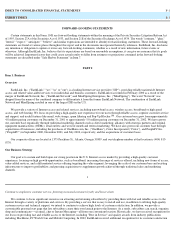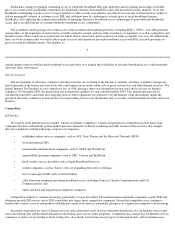Earthlink 2002 Annual Report Download - page 10
Download and view the complete annual report
Please find page 10 of the 2002 Earthlink annual report below. You can navigate through the pages in the report by either clicking on the pages listed below, or by using the keyword search tool below to find specific information within the annual report.
regulations which do or could affect our business. The significant areas of regulation for our business include telecommunications industry
regulation in general, and specifically, broadband access as well as Internet taxation.
Telecommunications Regulation
Neither the Federal Communications Commission ("FCC") nor any other governmental agency directly regulates ISPs, which are
classified as unregulated providers of "information service" rather than regulated "telecommunications service" under the terms of the
Telecommunications Act of 1996. Accordingly, most regulations that apply to telephone companies and other common carriers do not apply to
us. We are not required to contribute a percentage of gross revenue to support "universal service" subsidies for local telephone services or other
public policy objectives, such as advanced telecommunications systems for schools, health care providers and libraries. Such classification may
discourage states from regulating ISPs as telecommunications carriers or imposing similar subsidy obligations.
Nevertheless, Internet-
related regulatory policies are continuing to develop, and it is possible that we could be exposed to regulation in the
future. For example, the FCC could subject certain services offered by ISPs to regulation as telecommunications services. Among other things,
the FCC could decide to regulate voice and fax telephony services provided over the Internet as "telecommunications" or a
"telecommunications service" even though Internet access itself would not be regulated. A decision by the FCC to impose telecommunications
carrier regulations on ISPs or on some of the services they offer could result in us being subject to universal service fees, regulatory fees and
other fees imposed on regulated telecommunications providers as well as heightened costs of regulatory compliance.
We could also be affected by any change in the ability of customers to reach our network through a dial-up telephone call without any
additional charges. The FCC has ruled that ISPs are enhanced service providers and are thus exempt from the access charges that apply to
traditional telecommunications companies. Local telephone companies assess charges on long-distance companies for the use of the local
telephone network to originate and terminate long-distance calls, generally on a per-minute basis. We could be adversely affected by any
regulatory change that would result in the imposition of access charges on ISPs because this would substantially increase the cost of using the
Internet.
State public utility commissions generally have declined to regulate enhanced or information services. Some states, however, have
continued to regulate particular aspects of enhanced services in limited circumstances, such as where they are provided by incumbent local
exchange carriers ("ILECs") that operate telecommunications networks. Moreover, the public service commissions of some states continue
8
to review potential regulation of these services. There can be no assurance that state regulatory authorities will not seek to regulate aspects of
these activities as telecommunications services.
Broadband Access
We purchase "last mile" broadband access from ILECs; competitive local exchange carriers ("CLECs"); and cable providers. The term
"last mile" generally refers to the element of telecommunications networks that is directly connected to homes and businesses (hereinafter
referred to as the "last mile"). ILECs are required by current law to make last mile access available on a non-discriminatory basis to ISPs like
EarthLink, although there are currently both regulatory and legislative proposals which could change this requirement. Cable providers are not
required by current law to make last mile access available to ISPs like EarthLink; however, Time Warner Cable was required to make last mile
access available over its cable facilities as a condition of completing a merger.
In November 1999, the FCC issued an order which allowed CLECs, such as Covad Communications Group, Inc. ("Covad"), the ability to
separately purchase from the ILECs the High Frequency Portion of the Loop (HFPL) used to provision DSL services. This is commonly known
as line sharing. In May 2002, the U.S. Court of Appeals vacated and remanded the FCC's line sharing decision. On February 20, 2003, the FCC
voted 3-2 to support an order which will eliminate line sharing, subject to a three-year phase-out period. At the end of that period, CLECs,
including Covad, could be required to pay a full unbundled loop rate to the ILECs. Covad believes that it has an ongoing right to line-sharing
under its contractual agreements with the ILECs, subject to change-in-law provisions. If Covad cannot continue to purchase line-shared
services, we may move our customers provisioned on Covad's network to another wholesale broadband providers' network, including ILECs'
and/or cable providers' networks. If we are required to move these customers or if the ILECs substantially increase the cost of such services,
our business could be materially adversely affected.
The availability of and charges for last mile broadband access with most ILECs are governed by contracts with up to four years remaining
on current contract terms. One of our ILEC broadband providers sets availability and prices based on tariff rates, which are subject to change
from time to time, rather than contract. We do not believe our contracts with the ILECs are subject to the aforementioned line-sharing
regulations; however, regulatory actions regarding line-sharing as well as the competitive environment may adversely affect our ability to
extend or renew our current contracts with ILECs on terms acceptable to us. We believe that, regardless of regulatory decisions that may be
made, ILECs will continue to sell wholesale broadband access on economically reasonable terms to ISPs like EarthLink, although there can be
no assurance of this. Our contracts with our cable providers and Covad, our principal CLEC, have up to four years remaining on current
contract terms.























